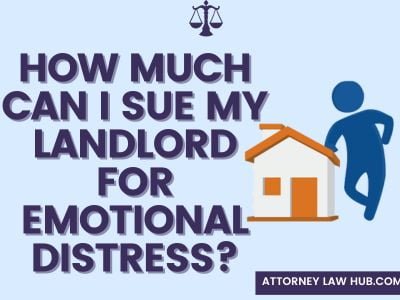Filing a complaint against your landlord for emotional distress might be difficult legally. In order to file a lawsuit against your landlord in the USA for emotional distress, you normally have to show that their actions were deliberate or careless and caused you great emotional suffering.
Claims for emotional distress can cover a wide range of events, including violations of privacy, harassment, and dangerous living circumstances brought on by improper maintenance. In order for an action to be successful, your attorney must show that your landlord’s carelessness or deliberate damage caused your mental distress.
Don’t miss the table below to know exactly, How much can I sue my landlord for emotional distress?
By Attorney Law Hub
Depending on the particulars of the case and the degree of distress, the amount of compensation may change. The following are some essential considerations:

Document Everything:
Maintaining documentation of events that have caused you emotional discomfort is essential. This includes any images, recordings, letters, and correspondence you may have had about the problem with your landlord.
Speak with an attorney:
It is strongly advised that you speak with a lawyer who focuses on landlord-tenant cases. They can assist you in comprehending the legal consequences of your situation.
Types of Emotional Distress:
Incidents like harassment, breach of privacy, or neglecting to make required repairs that result in dangerous living conditions are examples of events that might give rise to emotional distress claims.
Proving Negligence or Purposeful Harm:
Your attorney must demonstrate that your landlord’s conduct directly contributed to your mental suffering and was either negligent (careless) or purposeful.
Damages:
You have the right to seek compensation for emotional distress, but the amount you receive will depend on a number of factors, including the severity of your case and the circumstances surrounding it.
Statute of Limitations:
Be aware that you have a finite amount of time to initiate a lawsuit; therefore, you must move quickly.
Keep in mind that every case is different and that results could differ. If you would like to successfully sue your landlord for emotional distress, speak with a qualified legal professional who can offer you specialised advice and counsel depending on your condition.
How do I sue my landlord for emotional distress?

Simply put, to file a case for emotional distress against your landlord, take the following actions: First, start assembling proof of the troubling incidents, including pictures, notes, and correspondence with your landlord in writing.
To help you navigate the legal system, speak with a lawyer who focuses on landlord-tenant issues after that. If your case involves carelessness or deliberate injury by your landlord, your attorney will assist in determining that. Act quickly because there is a time restriction for initiating a lawsuit, so keep that in mind.
Recall that mental distress can be brought on by a variety of problems, such as harassment or dangerous living circumstances, as a result of improper maintenance. To increase your chances of winning your case, get situation-specific legal guidance.
Different kinds of emotional distress
There are many ways that emotional distress can appear; the following are some common ones:
General Distress:
This is a wide category that includes depressive, anxious, and scared sensations brought on by a range of life experiences.
Negligent Infliction of Emotional Distress (NIED):
When someone is careless and creates emotional distress, such as when a landlord neglects to provide a safe living environment, this is known as Negligent Infliction of Emotional Distress (NIED).
Intentional Infliction of Emotional Distress (IIED):
This refers to deliberate acts, such as harassment, that result in severe emotional distress.
Physical Symptoms:
Headaches, issues with digestion, and sleep disruptions are examples of physical symptoms that can result from emotional discomfort.
Post-Traumatic Stress Disorder (PTSD):
Flashbacks, anxiety, and avoidance behaviours are symptoms of PTSD that can be brought on by traumatic experiences, particularly those involving housing.
Grief and loss:
Deep grief and emotional pain can be brought on by the death of a loved one or damage to property.
Invasion of Privacy:
When someone’s privacy is violated, such as when someone breaks into your house without permission, it can cause emotional discomfort.
What qualifies as emotional distress in a landlord-tenant dispute?
In a landlord-tenant conflict, emotional distress refers to feelings of extreme agitation, nervousness, or mental distress brought on by the landlord’s actions or circumstances.
Harassment, a violation of privacy, dangerous living conditions, and neglected maintenance that compromises your health are some of the things that might cause this anxiety. It typically requires extreme emotional distress that can be demonstrated in court in order to be eligible.
To find out whether your particular circumstance counts as emotional distress in a landlord-tenant dispute, it is essential that you speak with a lawyer.
What is the emotional distress amount range in various jurisdictions?
The amount that can be sued for emotional distress varies significantly depending on the jurisdiction, the specific circumstances of the case, and the laws in place. There is no fixed or universal amount for emotional distress claims.
In some cases, emotional distress damages may be a few thousand dollars, while in more severe cases, they can reach hundreds of thousands or even millions of dollars. Here is a general estimate of emotional distress damages in different US jurisdictions; however, please remember that these are approximations and may differ significantly:
| State | Minimum Grant Amount | Maximum Grant Amount |
|---|---|---|
| Texas | $30,000 | $150,000 |
| Illinois | None | $200,000 |
| Ohio | $40,000 | $180,000 |
| Arizona | $40,000 | $150,000 |
| Georgia | None | $300,000 |
| Pennsylvania | None | $250,000 |
| Michigan | $30,000 | $160,000 |
| North Carolina | $30,000 | $130,000 |
| Virginia | None | $180,000 |
| Colorado | $40,000 | $170,000 |
| Nevada | $50,000 | $200,000 |
| New York | $50,000 | $200,000 |
| California | None | $250,000 |
| Florida | $30,000 | $120,000 |
| Iowa | $60,000 | $250,000 |
| Kansas | $50,000 | $200,000 |
| New Jersey | $50,000 | $300,000 |
What damages can I claim when suing a landlord for emotional distress?
You can usually get damages in a lawsuit against a landlord for emotional distress, including money to make up for the emotional pain you’ve suffered. These damages could include things like tension, worry, and even bodily symptoms like harassment or dangerous living conditions that were brought on by your landlord’s activities.
You may also file a claim for payment of any associated therapy or medical charges. The intensity of the distress and the particulars of your case will determine how much compensation you receive. It’s crucial to speak with a lawyer to find out exactly what damages you can sue for and to make sure you’re going after a settlement.
What are the steps to take before suing a landlord for emotional distress?
There are a few important things to think about before suing a landlord for emotional distress. First, confirm that you have documentation of the incidents that offended you. Images, emails, and other conversations you have with your landlord about the problem can be included here.
It’s necessary to let your landlord know about your issues and ask for a solution. If it doesn’t resolve the issue, speak with a lawyer with experience in landlord-tenant cases. They can walk you through the procedure and assist you in understanding your legal alternatives.
To avoid going to court, a settlement or discussion may be investigated in some circumstances. Remember that you have a period of limitations, which is a time restriction within which you can file a lawsuit.
Is it difficult to win a lawsuit against a landlord for emotional distress?
A case for emotional distress against a landlord can be difficult to win. It is difficult because you must demonstrate that you suffered severe emotional distress as a result of your landlord’s behaviour. Robust evidence and legal skills are frequently necessary for this.
Keeping documents, documenting incidents, and getting legal counsel are all necessary to determine your prospects of victory. A case like this can be difficult to win, but the procedure can be intricate, and the result is dependent upon the details of your case, the quality of your evidence, and the skill of your legal counsel.
Do I need a lawyer to sue my landlord for emotional distress?
You don’t absolutely need a lawyer to sue your landlord for emotional distress, but having legal representation is highly advisable. A lawyer can guide you through the legal complexities of emotional distress lawsuits, ensuring that you are aware of your rights and are able to present a compelling case.
They can help you collect proof, properly file paperwork, and negotiate with your landlord or their legal representatives. You can defend yourself in an emotional distress case, but it can be difficult, and hiring an attorney will usually increase your chances of victory.
How much compensation can I expect in an emotional distress lawsuit?
In an emotional distress claim, the amount of compensation is not set in stone and can vary significantly depending on a number of circumstances. It’s crucial to recognise that exact sums rely on jurisdiction, the court’s discretion, and case-specific factors, even if I’m giving you a rough range to work with.
Compensation in cases involving psychological distress often varies between $1,000 and $10,000. This is only a preliminary estimate to help you get a sense of what people typically receive; it is not meant to be exact. Awards inside or outside of this range may be given in certain instances. Acknowledging that emotional distress damages are more subjective in nature and less objective than economic damages (like medical costs or lost earnings) is crucial.
Cost of Hiring an Emotional Distress Lawyer
Depending on a number of factors, the cost of involving a lawyer for emotional distress can fluctuate significantly. Many personal injury and landlord-tenant lawyers in the United States take claims on a contingency fee basis.
This implies that they only get paid if you win your case. Usually, they take a portion of the money you obtain, usually between 30 and 40 percent. You may be out of pocket if your case is unsuccessful. Hourly charges, which can range from $100 to $500 or more per hour, are sometimes charged by lawyers.
There may also be filing fees, initial consulting fees, and other costs. It is imperative that you and your attorney talk about fees and payment plans during your initial session in order to determine the exact cost structure for your particular case.
Conclusion
The procedure of suing your landlord for emotional distress is complex and requires careful documenting of upsetting events, the assistance of a specialised lawyer, and the vital task of demonstrating that the landlord’s careless or intentional conduct is the cause of your emotional distress.
Numerous factors, such as the particulars of your case and the regulations in your area, could affect how much compensation you could get in such a scenario. Having legal representation can be expensive, but having one greatly increases your chances of a favourable result, even though it’s not required.
Essentially, getting legal counsel tailored to your particular situation is still a critical first step in negotiating the complex field of emotional distress claims against landlords.




